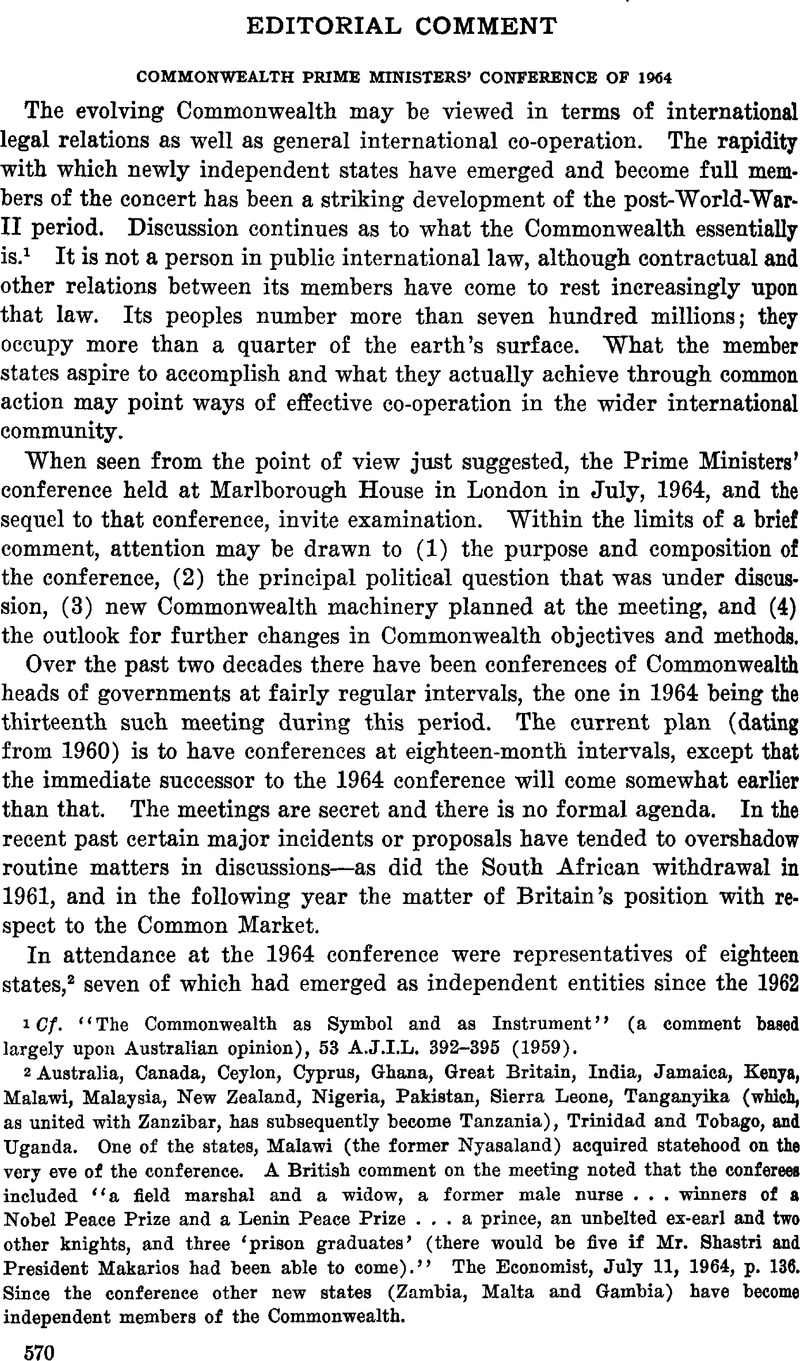No CrossRef data available.
Article contents
Commonwealth Prime Ministers’ Conference of 1964
Published online by Cambridge University Press: 28 March 2017
Abstract

- Type
- Editorial Comment
- Information
- Copyright
- Copyright © American Society of International Law 1965
References
1 Cf. “The Commonwealth as Symbol and as Instrument” (a comment based largely upon Australian opinion), 53 A.J.I.L. 392-395 (1959).
2 Australia, Canada, Ceylon, Cyprus, Ghana, Great Britain, India, Jamaica, Kenya, Malawi, Malaysia, New Zealand, Nigeria, Pakistan, Sierra Leone, Tanganyika (which, as united with Zanzibar, has subsequently become Tanzania), Trinidad and Tobago, and Uganda. One of the states, Malawi (the former Nyasaland) acquired statehood on the very eve of the conference. A British comment on the meeting noted that the conferees included “ a field marshal and a widow, a former male nurse … winners of a Nobel Peace Prize and a Lenin Peace Prize … a prince, an unbelted ex-earl and two other knights, and three ‘prison graduates’ (there would be five if Mr. Shastri and President Makarios had been able to come).” The Economist, July 11, 1964, p. 336. Since the conference other new states (Zambia, Malta and Gambia) have become independent members of the Commonwealth.
3 The Economist, July 18, 1964, p. 230.
4 An article by “ A Conservative” contained,inter alia, the following statements: “The Commonwealth has really become a gigantic farce. Most people, including moat Conservatives, know this, and in their hearts they despise the politicians who keep the farce going. Not merely the non-European members … but the so-called ‘Old Dominions’ have no present real ties with Britain other than such as history might have left between any two foreign nations.” The Times (London), April 2, 1964, p. 13.
5 Apparently the Government of Southern Rhodesia felt that it was entitled to an invitation to the 1964 conference. The reported statement of Prime Minister Ian Smith before the 1964 conference was to the effect that Southern Rhodesia had in the past been invited to attend the Prime Ministers’ conferences and that, since the break-up of the Federation, Southern Rhodesia had assumed the rights and privileges of Commonwealth membership which it had before these were surrendered to the Federation. The Times (London), April 21, 1964, p. 10.
6 British Information Services, Reference and Library Division, T.18 (July 16, 1964), p. 12.
7 Ibid., Political and Economic Notes, Supp. to British Record No. 11 (July 23, 1964), p. 3.
8 Official Communiqué(referred to in note 6 above), p. 5. The text of the mentioned treaty is in New Zealand Treaty Series, 1962, No. 5.
9 John W. Holmes, “Present Realities of the Commonwealth,” a paper presented to the National Conference on Canadian Goals, at Fredericton, Sept. 9-12, 1964.




